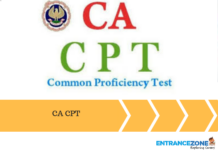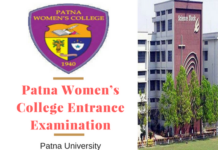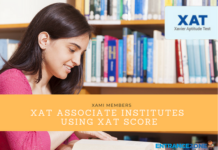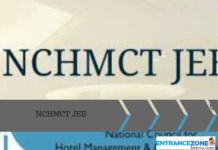Central Teacher Eligibility Test (CTET) is a national level entrance test that is conducted by the Central Board of School Education (CBSE) twice a year. The exam will be conducted by local authorities of every state before the recruitment of teachers. Through this exam, candidates can become teachers in government schools. The CTET exam consists of two papers i.e Paper-I and Paper-II. Paper-I is for the candidates who want to teach from class 1 to class 5 and paper 2 is for candidates who want to teach from class 6 to class 8.
Admission Open 2023
- Top University & Colleges Official Links, Application & Scholarship Forms.
CTET Dec 2021 Application Form Released
What is the Central Teachers Eligibility Test (CTET)?
Contains
Central Teachers Eligibility Test (CTET) is an exam to shortlist the Candidates for appointment as teachers in class 1 to class 8.
Subscribe to Get Updated Information about What is Central Teachers Eligibility Test (CTET)? Apply For CTET Dec Session - Admissions
- According to the Ministry of Human Resource Development, It is compulsory for the local authorities to conduct the CTET exam before the recruitment of teachers.
- The Candidates should be recruited who are the most skilled and responsible for the young children.
- As per the new rules by the Government of India, having a B.Ed degree is not enough to become a teacher.
- Now, Candidates have to clear the Teacher Eligibility Test (TET) in order to become a teacher in any state of India.
- On the other hand, Candidate have to fulfil the basic eligibility criteria to appear for the CTET exam.
CTET 2021 Eligibility Criteria
The details regarding the CTET Eligibility Criteria is given below:
- Candidates must have passed class 12 with minimum 45% aggregate marks to be eligible for the post of Primary Teacher.
- Candidates must have passed their graduation with a minimum 45% or class 12 with a minimum 50% are eligible to apply for the post of an elementary teacher.
- Candidate must have completed their prescribed teacher training/ education courses before the exam.
CTET 2021 Exam Pattern
The details regarding the CTET Exam Pattern is given below:
- CTET exam pattern is organised by Central Board of School Education (CBSE), Delhi.
- According to the CTET 2020 notification, no changes in the exam pattern is made by the authority.
- The exam pattern is different for each exam which is given in the table below:
| Particulars | Paper-I | Paper-II |
| Exam Mode | Offline | Offline |
| Number of Subjects | 05 | 04 |
| Duration of Exam | 2.5 hours | 2.5 hours |
| Total questions | 150 | 150 |
| Total Marks | 150 | 150 |
| Type of questions | MCQ type | MCQ type |
| Language of Exam Paper | English and Hindi | English and Hindi |
| Marking scheme | +01 for correct answer | +01 for correct answer |
| 0 for incorrect answer | 0 for incorrect answer |
CTET 2021 Syllabus
The details regarding the CTET Syllabus is given below:
- The syllabus for Central Teacher Eligibility Test is different for Paper-I and Paper-II.
- CTET Syllabus focuses on Child development & Pedagogy and the concept of education.
- The syllabus consists of two languages in the exam in each paper.
- Other than that, Candidates need to focus on Science/ Environmental Science apart from mathematics.
CTET 2021 Highlights
The overview of CTET exam are given in the table below:
| Exam Name | Central Test Eligibility Test (CTET) 2021 |
| Conducting Body | Central Board of Secondary Education |
| Exam Level | National Level |
| Exam Frequency | Twice a year |
| Exam Mode | Offline mode |
| Duration | 150 minutes |
| Language | English and Hindi |
| Purpose of Exam | To shortlist Candidates |
| Number of test Cities | 112 cities all across India |
| Contact Number | 011-22235774 |
| Official Website | https://ctet.nic.in/webinfo/Public/Home.aspx |
Other Important Links on CTET
Central Teacher Eligibility Test (CTET)
The Central Teacher Eligibility Test (CTET) is a national level examination conducted by the Central Board of Secondary Education (CBSE) for aspiring teachers who want to teach in government schools across India. The CTET is a two-tier examination, with Paper 1 for primary school teachers and Paper 2 for upper primary school teachers.
The CTET syllabus covers a wide range of topics related to education, including child development, pedagogy, curriculum, assessment, and teaching methods. The exam is conducted in a pen-and-paper format, and the questions are multiple choice in nature.
The minimum qualifying marks for the CTET are 60% for both Paper 1 and Paper 2. The CTET is a lifetime qualification, which means that once you pass the exam, you do not need to take it again.
The CTET is a valuable qualification for aspiring teachers, as it demonstrates your knowledge and skills in education. The exam can also help you to secure a job in a government school, which can provide you with a stable and rewarding career.
Here are some of the benefits of qualifying for the CTET:
- You can become eligible to teach in government schools across India.
- You can get a higher salary than teachers who do not have the CTET qualification.
- You can get a better chance of getting a job in a good school.
- You can get a promotion in your current job.
If you are interested in teaching, the CTET is a valuable qualification that can help you to achieve your career goals.
Here are some of the frequently asked questions about the CTET:
- What are the eligibility criteria for the CTET?
To be eligible for the CTET, you must have a bachelor’s degree in any discipline from a recognized university. You must also have completed a teacher training course from a recognized institution.
- How can I apply for the CTET?
The CTET application form is available online on the CBSE website. You can apply for the exam by filling out the application form and submitting the required documents.
- When is the next CTET exam?
The next CTET exam is scheduled to be held in July 2023. The exact dates will be announced by the CBSE in due course.
- Where can I find more information about the CTET?
You can find more information about the CTET on the CBSE website. You can also contact the CBSE helpline for more information.





















